The main goal of any ecommerce business is a satisfied customer. If you are not selling an utterly exclusive product, you will operate in a competitive market. Therefore, merchants spend a lot of resources on attracting new customers and retaining existing ones. The attraction is not an easy task, but for keeping them, you need to be able to communicate directly, provide personalized approaches, and satisfy requests at the highest level. This is exactly the opportunity that CRM (Customer Relationship Management System) provides. We discovered the best CRM software for ecommerce. Read, choose the best one that fits your business needs and implement.
Why is CRM needed for ecommerce?
CRM is a tool that allows retailers to interact with their customers by collecting huge volumes of data about them and, therefore, to personalize messages. Properly leveraging the benefits of CRM solves a range of business problems while saving time and money.
CRM is especially important for ecommerce, as it compensates for the lack of daily face-to-face contact with customers. Making the right conclusions from the collected data, the retailer will adapt its marketing to the customers’ tastes, habits, and expectations. All such information is a multitool for increasing revenue.
Simply stated, CRM software for eCommerce helps to drive sales. An effective platform displays the customer journey, allowing you to collect, analyze, and use user data to increase profits.
Statistic of CRM market
Numbers don’t lie. So let’s take a look at the big picture and then focus on the three most important numbers for any retailer that aims to grow its business. There are more than 4000 CRM systems globally. The CRM market is now worth about USD 44.64 billion. And it’s expected to reach $80 billion by 2025.
Customer Relationship Management (CRM) software revenues have overtaken database management systems to become the largest of all software markets.
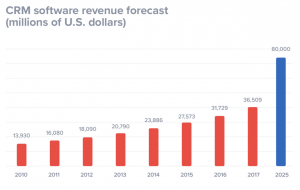
And here is why these statistics are so important for any retailer. First, buyers are getting better at buying than sellers are getting at selling. Due to globalization and open markets, competition has grown dramatically for the past 10 years. The number of companies that build a customer-focused strategy is rapidly growing because many retailers have realized that boosting customers’ demand is a path to increasing sales.
Second, an acquisition of a new customer costs from 5x to 10x times more than motivating an existing one to make another purchase. A small piece of data about your one-time customer doubles your chances to return him or her to your e-store for another time. If you spend thousands of dollars on advertisements but your customers don’t come back after one purchase, you are just burning the budget for nothing.
And finally, the market of these systems grows because CRM is a business application. Yes, it looks like a useful tool for marketing and sales but it is a looking glass for management to effectively plan, lead, and check the business on the run. No need to spend weekly hours conferencing with multiple departments if you can get all important business metrics on your CRM dashboard.
Benefits of CRM Solution
Many merchants are hesitant to invest in a CRM installation. The answer can be found by considering the main advantages of such a solution.
#1 Collecting Customer Data
The best way to collect custom data information is to request registration. All the data entered by the user, even if it is only a name and mail/phone number, will already help to personalize the approach to communication. You can also collect data by inviting visitors to subscribe to a useful newsletter or share data in exchange for a bonus/discount. The more data you know, the better you will target offers and increase conversion.
#2 Re-Engaging Customers
CRM for eCommerce makes it possible to increase sales by making additional sales, offering related products, providing personalized promo codes, gift discounts, and other benefits of loyalty programs.
#3 Email Marketing
Email marketing is an indispensable tool to keep in touch with a client and increase loyalty. Marketing automation makes it possible to personalize newsletters & offers, to remind customers of incomplete purchases, to take care of clients’ shopping experience. According to the “Email Marketing Industry Census 2017” (Econsultancy & Adestra), email marketing takes the lead in terms of the return on investment it provides.
#4 Analytics is the basis for planning
Analytical data is very important for retailers, as it is the basis for strategic planning. The more relevant data is collected, the more accurate decisions can be made. An effective CRM software should provide in-depth analytics about the products in greatest demand, the most effective advertising campaigns, the purchase history of each customer, and a lot of other data.
#5 Customer Support
When you sell in a competitive market, reputation matters. Customers need to feel cared for. The simple chatbot on a website that can quickly provide support or accept your request will show that you are always ready to remedy any situation. A correctly provided service is a chance to retain a client and motivate him to return again.
#6 Social Media Integration
Social media is one of the most important lead generation channels. Also, it is through social media that users share their feedback about the buying process, the seller, and the product itself. Thus, by communicating with customers through networks, retailers build loyalty.
Comparing Customer relationship management systems, it is impossible to say which one is better, because every business is looking for exactly the solution that will cover its needs. Small businesses want to grow and they need simple started CRM to automate some sales and marketing processes. And industry leaders are looking for large-scale solutions to fit all business needs by the rule: do more for less time.
CRM software is of two types:
- SaaS solutions or “boxed” solutions. When buying and installing such systems, you do not need to hire your own in-house developers. You just need to purchase a ready-made solution and adapt it to the needs of your business through extensions and third-party integrations.
- Open source CRM systems that allow you to create CRM specifically for your needs, customizing all processes. Such software often requires the assistance of experienced eCommerce solution partners. But at the same time, they will close all the necessary requests much more accurately.
We have compiled a list of the most popular eCommerce CRM solutions for both SMBs and enterprises. The main criteria by which we selected and compared software:
-
The type of business that will be comfortable working with CRM.
-
The availability of functionality for organizing both sales and marketing, which is very important for eCommerce businesses.
-
What user data does CRM work with and the depth of the analytics provided.
-
How easy is CRM integration with external applications.
-
Pricing policy and models.
We also made an analysis of such important parameters as Hidden costs and Total cost of ownership. Hidden costs are hidden because you find out about them at the time of purchasing the service. Therefore, we tried to collect data from open sources, including experts & users reviews on what costs have appeared unexpectedly.
The total cost of ownership is a parameter indicating the total price from the moment of purchase of a CRM system, including its implementation and future support. We counted TCO for a year for a clear understanding of how these costs look in the company’s balance sheet. Understanding TCO is essential for making valid financial decisions, understanding payback times, and business performance.
Read also: eCommerce Total Cost of Ownership (TCO) or How Much Does an Online Store Cost?
The Best CRM Software for Ecommerce
Salesforce
Salesforce is considered one of the most widely used CRMs in the world, covering the needs of primarily enterprise-level companies. It is a customer-focused company with a full range of tools that solves all business needs. This solution is cloud-based, which means that the user does not need to spend resources on developing an individual system, it is enough just to install a ready-made solution with full access to the functionality.
CRM itself is feature-rich, and also can be integrated with a large pool of different tools. At the same time, describing Salesforce in one word – it is “easy to use“. As the inventors say, Salesforce is used to close bigger deals, faster.
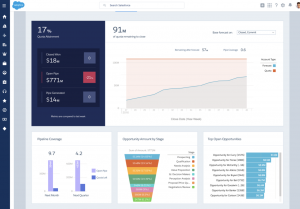 Pros:
Pros:
- Quick launch and easy to scale. The cloud deployment substantially simplifies configuration and administration.
- Can be customized by adding/removing features to suit needs.
- CRM is accessible round-the-clock from anywhere worldwide.
- Expensive with implicit costs.
- The lack of control over system upgrades and planned downtimes.
- The learning curve seems endless.
Zoho
Zoho is one of the TOP 3 CRMs in the world by customers’ choice. This boxed system was originally created for SMBs, but today it is suitable for businesses of all kinds and sizes. It includes functionality for sales automation, marketing, reporting, and forecasting. With Zoho, you can close more deals in less time, get real-time customer insights, customize marketing campaigns, and implement an omnichannel approach.
Starting with the Enterprise plan, Zoho offers the advantage of Zia artificial intelligence. Zia uses state-of-the-art machine learning algorithms to boost your business. Zoho enables CRM integration with the most popular marketing and eCommerce tools like MailChimp, OneSaaS and others.
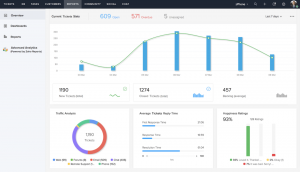 Pros:
Pros:
- Large selection of tools covers all business needs.
- All-around reporting feature.
- Seamless integration with other Zoho products.
- Some of the features prove limited as demands increase.
- A lot of customization is needed to start.
- Forms aren’t optimized for conversion.
Act!
Act! is the best CRM for small business and medium-sized companies that aims on active contact outreach.
Act! gives an ability of:
- design an effective customer journey with automated outreach
- carry out multiple email marketing campaigns with the ability to send impact letters
- get real-time metrics for making smart business decisions along with providing an analysis of individual and team performance
This Customer relationship management system allows you to combine sales and marketing activities to achieve operational efficiency. With the collected customers’ information, you have the ability to make clear predictions and quickly adapt your strategy to the identified changes.
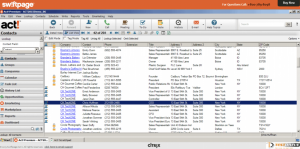 Pros:
Pros:
- Price policy is suitable for any budget.
- Very easy and simple to use CRM.
- Provides great customer support.
- There are too many features that are not needed or commonly used.
- Issues with synchronization between apps.
- Still missing some of the cloud components.
Microsoft Dynamics
CRM Microsoft Dynamics is designed for medium and large enterprises. This solution is more expensive in comparison with competitors, but pricing is very transparent and you definitely avoid hidden costs. It is a suite of smart business solutions that includes sales, customer service, finance, marketing, and more. Like other systems, this CRM allows you to set up the most effective customer acquisition and retention campaigns.
CRM system Microsoft Dynamics can be installed on Windows computers and integrated with various third-party applications. It works the same locally or in the cloud. The main benefits of Microsoft Dynamics 365 are its mobile support, comprehensive feature set and scalability.
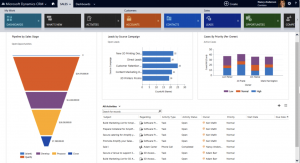 Pros:
Pros:
- The breadth of features can satisfy any business request.
- The price is very clear without hidden costs.
- Simple CRM integration with other Microsoft products.
- Relatively pricier than the others CRMs.
- Some types of customization (ex., reporting) aren’t simple and take a lot of time.
- There are issues with customer support service.
HubSpot
HubSpot CRM is one of the easy-to-use solutions with an intuitive interface. This software solution is free for individual sales representatives. Sales tools of HubSpot include such parts as Contact management, Deals & tasks, Company insights, Pipeline management. Marketing tools help turn website visitors into leads, send personalized emails based on customer behavior, and even schedule appointments. Sales leaders have the opportunity to receive detailed reports on the productivity of the team’s work, open cases, and closed deals.The advanced HubSpot Sales Pro plan allows you to make calls to potential customers with the ability to record them.
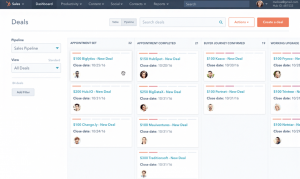 Pros:
Pros:
- It is free to use for individual sales representatives.
- Allows to see the entire sales pipeline, manage reports according to needs, and adapt the strategy.
- Uses the same database for both sales and marketing, so it helps to avoid integration issues.
- Advanced versions if slightly expensive for SMBs.
- Analytics does not provide the same depth as other CRM.
- It’s good for growing businesses. But organizations with large sales teams might find that HubSpot CRM isn’t advanced enough just yet.
Pipedrive
The best CRM for small business that is just making the first steps to work on a selected market. It is extremely customizable and offers a range of solutions to boost your eCommerce sales. Users can customize an unlimited number of sales funnels, driving new leads, and boosting deals to success. LeadBooster’s virtual bot, web forms – all these tools generate new leads and automate interaction with them.
With Pipedrive CRM, you can also get up-to-date analytics and tailor your strategy, and manage your product catalog.
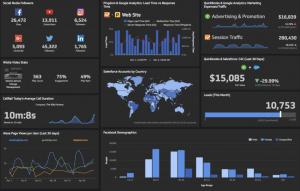 Pros:
Pros:
- Simple to use doesn’t require additional training.
- Easy to track the deals pipeline.
- Availability of meaningful features: virtual bot LeadBooster, web forms, etc.
- Third-party integrations are cheaper than Pipedrive’s next-level plan.
- CRM is good for SMBs, but functionality isn’t enough for big companies.
- The reports are very limited in the starter plan.
OROCRM
OROCRM is an open source CRM, allowing you to customize the solution as much as possible to meet all eCommerce business needs. Due to the ability to easily scale, the system closes requests for both mid-size retailers and international entities.
OROCRM targets Sales Managers, Marketers, and Customer Support Departments. Users can see and analyze the entire customer journey and determine the qualifications of the lead. Then they can set up targeted marketing campaigns by communicating with the clients in the right place at the right time. Other functions that CRM provides are designed to satisfy customer needs in any way, motivating them to return and make repeat purchases.
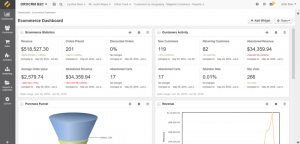 Pros:
Pros:
- Easy customization because of the open-source model.
- ORO’s multichannel capabilities are a must for today’s business.
- Good fit for companies with both B2B and B2C sales models.
- Quite complex to configure at first, but once you get it configured it will be totally worth your time.
- Marketing features are weaker than those of competitors or still missing.
- Lack of international localization.
SuiteCRM
SuiteCRM, an open-source CRM, allows users to create a customized sales process. Using it retailers can automate processes, model customer journeys, receive real-time reports. The advanced reports module allows you to create your own reports that can be loaded into your own panels.
You can set up effective interaction between different departments such as sales, marketing, customer service, and IT. This will help you to get a complete overview of the state of affairs and remove unnecessary barriers of communication. SuiteCRM offers to install web forms on your site to capture visitors and convert them into leads. This CRM allows you to create marketing campaigns, send emails, automate tasks to increase interest in the product.
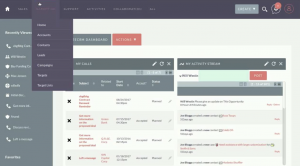 Pros:
Pros:
- Fully featured system comparable to leading proprietary CRMs.
- Can be customized according to business needs for appropriate price.
- It has depth reporting and searching functionality.
- Requires a high degree of technical knowledge to install and implement.
- There is an issue with integration feature and module creation because fast upgrades releases knock down in-house developed modules.
- Does not support iOS systems.
Odoo
Odoo CRM, due to its open code, provides customization and scalability of the system for the client. This CRM has an intuitive interface that makes it easy to manage the sales process. CRM allows you to integrate with a huge number of sales, marketing, financial and other tools in order to cover any business request. Customer relationship management system allows you to automatically generate leads based on completed forms or received calls. Some of the most useful marketing tools include: lead qualification, live chat on the site, duplicate removal, URL tracker.
Odoo offers 360° visibility – an ability to interact with the customer as accurately as possible due to the possession of large amounts of data (visited pages, open letters, meetings, pre-orders, unfinished orders, etc). CRM gives the ability to automate and track everything you do – centralized, online, and accessible from anywhere with any device.
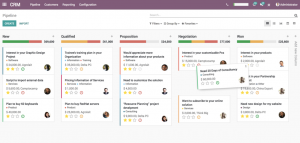 Pros:
Pros:
- The main benefits are omnichannel features, intuitive UI and modularized stack.
- Simple to integrate with third-party apps to improve business processes.
- Rapidly growing community that helps to solve any issues you may have.
- Free version is hard to maintain and often it needs the help of Odoo partner.
- Complicated pricing plans and the cost of applications can vary drastically.
- It’s hard to hire experienced Odoo developers.
Conclusion
We have presented a list of the best CRM software for eCommerce that has been rated by users as such that they improve sales and marketing efficiency. You can download the comparison table of CRM for eCommerce for better understanding which is the best for your business.
But, experience has demonstrated, only the practical use of this or that solution will show you how CRM meets your needs. You may find it helpful to use free trials and compare the benefits of each system.
Do not rush to give up if the box solution does not suit your needs. You can always do this kind of custom CRM integration that will match your request 100%.
And if you still have doubts about whether your business really needs a Customer relationship management system, you can read the article Reasons to implement CRM for your e-store on our blog.
A great piece that sheds much needed light on eCommerce development company and its impact on business as there are many new details you posted here.
Hi I am looking for CRM options for my new e-commerce portal. Looking forward for a dicussion. Regards
Ruchi Joshi
9657025442
Hi,
We will contact you directly by email.
Thanks for your interest!
Really a good insight to choose the best CRM!
Thank you!
Thank you very much for such a detailed material.
You’re very much welcome!
Thank you for creating CRM software list.
You’re very welcome!